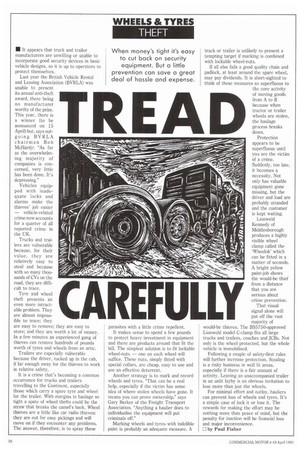WHEELS & TYRES THEFT
Page 28

If you've noticed an error in this article please click here to report it so we can fix it.
• It appears that truck and trailer manufacturers are unwilling or unable to incorporate good security devices in basic vehicle designs, so it is up to operators to protect themselves.
Last year the British Vehicle Rental and Leasing Association (BVRLA) was unable to present its annual anti-theft award, there being no manufacturer worthy of the prize. This year, there is a winner (to be announced on 15 April) but, says outgoing BVRLA chairman Bob McIlardy: "As far as the overwhelming majority of companies is concerned, very little has been done. It's depressing."
Vehicles equipped with inadequate locks and alarms make the thieves' job easier — vehicle-related crime now accounts for a quarter of all reported crime in the UK.
Trucks and trailers are vulnerable because, for their value, they are relatively easy to steal and because with so many thousands of CVs on the road, they are difficult to trace.
Tyre and wheel theft presents an even more intractable problem. They are almost impossible to trace; they are easy to remove; they are easy to store; and they are worth a lot of money. In a few minutes an experienced gang of thieves can remove hundreds of pounds worth of tyres and wheels from an artic.
Trailers are especially vulnerable because the driver, tucked up in the cab, if far enough away for the thieves to work in relative safety.
It is a crime that's becoming a common occurrence for trucks and trailers
travelling to the Continent, especially those which carry a spare tyre and wheel for the trailer. With margins in haulage so tight a spate of wheel thefts could be the straw that breaks the camel's back. Wheel thieves are a little like car radio thieves: they are out for easy pickings and will move on if they encounter any problems. The answer, therefore, is to spray these
parasites with a little crime repellent.
It makes sense to spend a few pounds to protect heavy investment in equipment and there are products around that fit the bill. The simplest solution is to fit lockable wheel-nuts — one on each wheel will suffice. These nuts, simply fitted with special collars, are cheap, easy to use and are an effective deterrent.
Another strategy is to mark and record wheels and tyres. "That can be a real help, especially if the victim has some idea of where stolen wheels have gone. It means you can prove ownership," says Gary Barker of the Freight Transport Association. "Anything a haulier does to individualise the equipment will put criminals off."
Marking wheels and tyres with indelible paint is probably an adequate measure. A
truck or trailer is unlikely to present a tempting target if marking is combined with lockable wheel-nuts.
If all else fails a good quality chain and padlock, at least around the spare wheel, may pay dividends. It is short-sighted to think of these measures as superfluous to the core activity of moving goods from A to B because when tractor or trailer wheels are stolen, the haulage process breaks down.
Protection appears to be superfluous until you are the victim of a crime. Suddenly, too late, it becomes a necessity. Not only has valuable equipment gone missing, but the driver and load are probably stranded and the customer is kept waiting.
Lionweld Kennedy of Middlesborough produces a highly visible wheel clamp called the Wheelok' which can be fitted in a matter of seconds. A bright yellow paint-job shows the would-be thief from a distance that you are serious about crime prevention.
That visual signal alone will put off the vast majority of would-be thieves. The BS5750-approved Lionweld model C-clamp fits all large trucks and trailers, coaches and JCBs. Not only is the wheel protected, but the whole vehicle is immobilised.
Following a couple of safety-first rules will further increase protection. Stealing is a risky business in well lit areas, especially if there is a fair amount of activity. Leaving an unaccompanied trailer in an unlit layby is an obvious invitation to lose more than just the wheels.
For minimal effort and outlay, hauliers can prevent loss of wheels and tyres. It's a simple case of lock it or lose it. The rewards for making the effort may be nothing more than peace of mind, but the penalty for inaction will be financial loss and major inconvenience.
0 by Paul Fisher












































































































